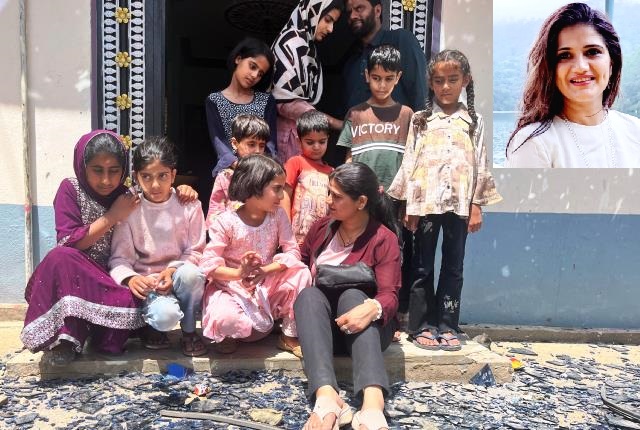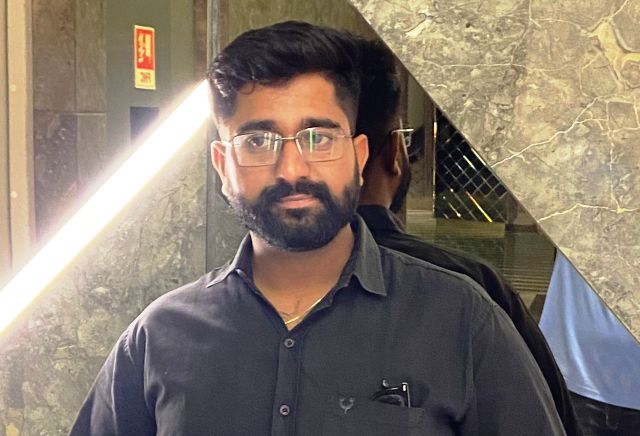Meha Dixit, a writer & researcher, recounts her days in Poonch during Operation Sindoor and the hardships faced by civilians trapped in the conflict zone.
On 8 May, 2025, when I arrived in Mendhar in the border district of Poonch from Srinagar, the local journalists had asked me to reach the same hotel where I had stayed previously in November 2024. This time, due to dangerous escalation between India and Pakistan along the LoC, with the hotel in the firing range, the entire staff had left for relatively “safer” locations. After handing me the keys of two rooms, the hotel owner too left for his home.The front room was capaciouswith large glass windows; the other room was cramped, which the hotel owner said, could beused as a shelter in case of heavy cross-border shelling.
Significantly, since Operation Sindoor was launched on the intervening night of 6-7 May, until the ceasefire, the mainstream media was virtually absent, with only a few local journalists covering the conflict in the Poonch district.
Since the day I landed in Mendhar, for seven days, until the 15th morning, I was alone in the two-storeyed hotel. On the evening of 8 May, around 7:30 pm, the juddering sound of shelling began to pound the border town. The streets were empty and grief-stricken with the howling of dogs growing louder. I ended up staying in Mendhar for 11 days, visiting several border villages such as Mankote, Bhera Dhaki, Sakhi Maidan, Chhajla, Dharana, and Bhera.
When I reached Bhera with three local journalists, the intermittent shelling started from across the border and we were required to exercise extreme caution. During my stay, the local journalists and some residents, who had not migrated to safer locations, were extremely supportive, even sending me home-cooked meals. During the last three days of my trip, I ended up staying with a local family.
ALSO READ: ‘News Anchor Whipped Up War Hysteria In Studios’
During the escalation along the LoC, Poonch turned into a ghost town, and most people from Mendharhad migrated to other relatively safer locations, such as Ari, Arni, Topa, Pathana Tir, and even Rajouri and Jammu.In Bhera Dhaki, a resident told me, “During heavy shelling, the entire village had moved to safer areas, mostly at their relatives’ homes. During the first night of heavy shelling, we tried to protect ourselves by laying on the floor. The next morning we left our village and returned only after the ceasefire.”
All the border residents, particularly the affected families I interacted with, said that they were unprepared for the dangerous escalation along the LoC after Operation Sindoor was launched. They said, had there been adequate number of bunkers in the Poonch district, precious lives could have been saved.The residents of Bhera Dhaki are even offering to provide land for the construction of bunkers.
The people of Poonch are especially enraged with the mainstream media for being insensitive to their woes and spreading false information during four days of dangerous escalation along the LoC. In one instance, a respected religious leader from Poonch, who lost his life during the shelling, was falsely accused of being a terrorist by some channels. The residents, to different communities, including Hindus, were infuriated with this false claim.
Most residents I spoke to called for peace between India and Pakistan. For them, military confrontation is not the solution since the common people, particularly those residing along the border on both sides, bear the brunt of cross-border shelling. As a resident of Mendhar told me, “While political leaders comfortably sitting in their air-conditioned, posh rooms make the decisions regarding war, ultimately it is us who have to suffer the consequences.”
I don’t think that such operations can prevent terrorist attacks in the future. Like the border residents said, “Military confrontation between the two belligerent neighbours is not the solution.”
The region of Jammu, Kashmir and Ladakh is a nuclear flashpoint. Any future military confrontation is likely to bring both India and Pakistan to the brink of a nuclear war, with a superpower like China with its strategic interests in Ladakh, being increasingly involved. This would only bring misery to the civilian population.
India and Pakistan have already fought four wars since 1947. These were the 1947-1948, 1965, 1971 and 1999 Kargil War; yet, terrorist attacks have continued in J&K. Were we able to reach a détente and ‘permanent peace’ in the region? No!
These wars only brought misery to the border residents — the Balti, Shina, and Hindu communities in Jammu being divided eternally. Besides, the villages along the international border have frequently witnessed low-intensity conflict. I believe a dialogue between the two countries can be the only solution.
(The narrator, a PhD in International Politics from JNU, Dellhi, has worked at Save the Children, Amnesty International, as Senior Consultant/Co-advisor with Ernst & Young, and has briefly taught at the Kashmir University, Srinagar. She is the author of Piece of War: Narratives of Resilience and Hope (SAGE 2020), the culmination of over a decade of field research in conflict and ‘post–conflict’ zones in South Asia, Middle East and West Africa. She is currently working on two books: ‘Post Abrogation Jammu, Kashmir and Ladakh: Gender, Intersectionality and Peace– Building, and ‘Territory & Turmoil: Ladakh and Gilgit-Baltistan’, (co-edited by Dr Saranjam Baig from Pakistan). Both books will be published in 2025 by Routledge.)
As told to Amit Sengupta

